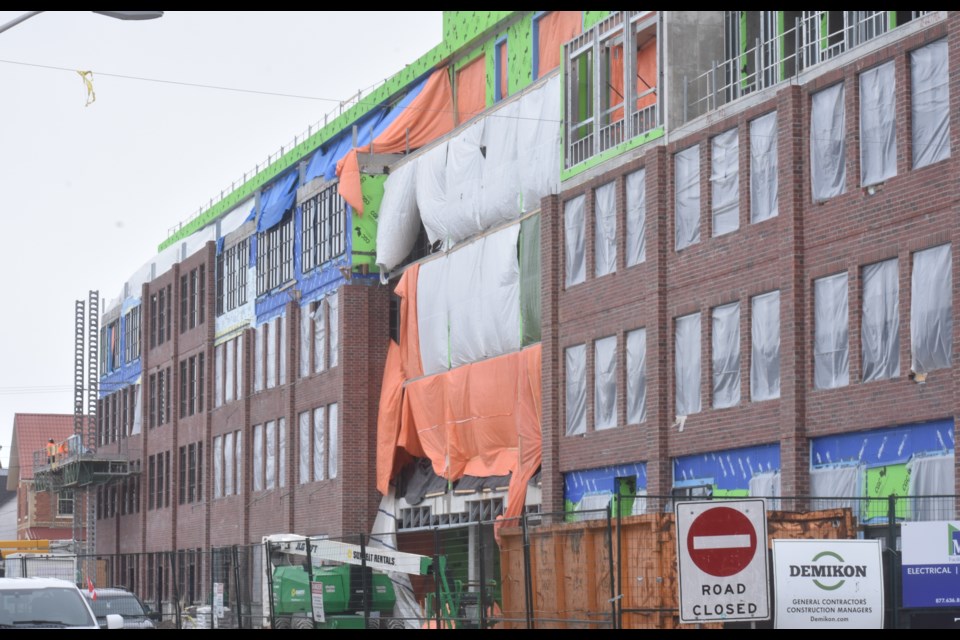The City of Orillia is set to increase its fees for various types of building permits, along with bringing in numerous amendments to the building bylaw.
Council considered the proposed changes at a public meeting Monday and gave the amendments tentative support, and will formally consider the changes at its March 20 meeting.
In a report to council, city staff stated building permit fees are meant to offset the costs of administering and enforcing the Building Code Act, which must not exceed the “anticipated reasonable costs” of doing so.
A number of the city’s proposed new fees were arrived at through weighing its fees against other nearby municipalities, and raising the fees, where applicable, to the median cost.
For example, staff recommended raising the cost of a residential deck permit from $134 to $185, which is the median price among the benchmark communities, which range from $114 to $350 for such a permit.
Staff also recommended hiking the minimum building permit fee from $134 to $150, the median cost among the benchmark community range between $100 and $250.
Staff also proposed introducing fees for issuing various orders as they relate to the Building Code Act, such as if building is taking place without a permit or if certain parameters are not met.
With an estimated 300 hours per year of staff time dedicated to issuing orders, at an average of five hours per order, the following fees are meant to subsidize staff time: order to comply ($375), stop-work order ($375), unsafe building order ($375), and registering an order on title ($200).
All changes proposed by staff would generate roughly $70,000 per year in revenue.
When surplus revenue is generated, additional money would be allocated the city’s building standards service continuity reserve fund, which may be drawn upon in years with less development, or where costs are not recovered through the program.
At Monday’s meeting, Coun. Jay Fallis wondered whether an exemption could be made for certain developments under the alternative solutions section of the proposed amendments, which comes with a $750 fee for buildings under Part 9 of the Building Code.
City staff generate alternative solutions in instances when meeting the building code may not be possible, and Fallis wondered whether, in cases where a resident might be trying to add an additional unit to a home, an exemption could be made.
“If we’re trying to encourage more units within town — it’s very specific, like it might mean one- or two-unit proposals a year — but I almost wondered about providing some type of exemption if this is for the purposes of building an extra unit, or even an affordable unit, there might be a reduction in cost,” he said.
Other members of council appeared open to the idea, but suggested Fallis introduce an inquiry motion at a later meeting of council.
“I think it would require a report because it’s hard to know without some facts and figures whether that’s needed, but I do think that we should reduce the red tape in any way that we can so that people can build more units, and especially if they’re going to be building affordable units,” said Coun. Janet-Lynne Durnford.
Coun. Ralph Cipolla wondered whether certain exemptions might be made for non-profit organizations, such as the $100 fee for a backflow preventer.
“Regarding churches and that, do they really need a backflow prevention?” he asked. “Some of these non-profit organizations can’t afford these. Is there a way that we can help with these backflow prevention devices that they need?”
Staff responded the fee is the “reasonable cost” for review or inspection of a backflow preventer, but said council can decide to provide exemptions where it wishes.
“With respect to reducing the fee … for certain interest groups or churches, (that) would not be my decision; that will be the decision of council,” answered Greg Miller, chief building official. “The $100 fee is essentially a minimum fee that we do have for a (backflow preventer).”
The comprehensive staff report on fee increases and bylaw amendments can be found on the council agenda page.
